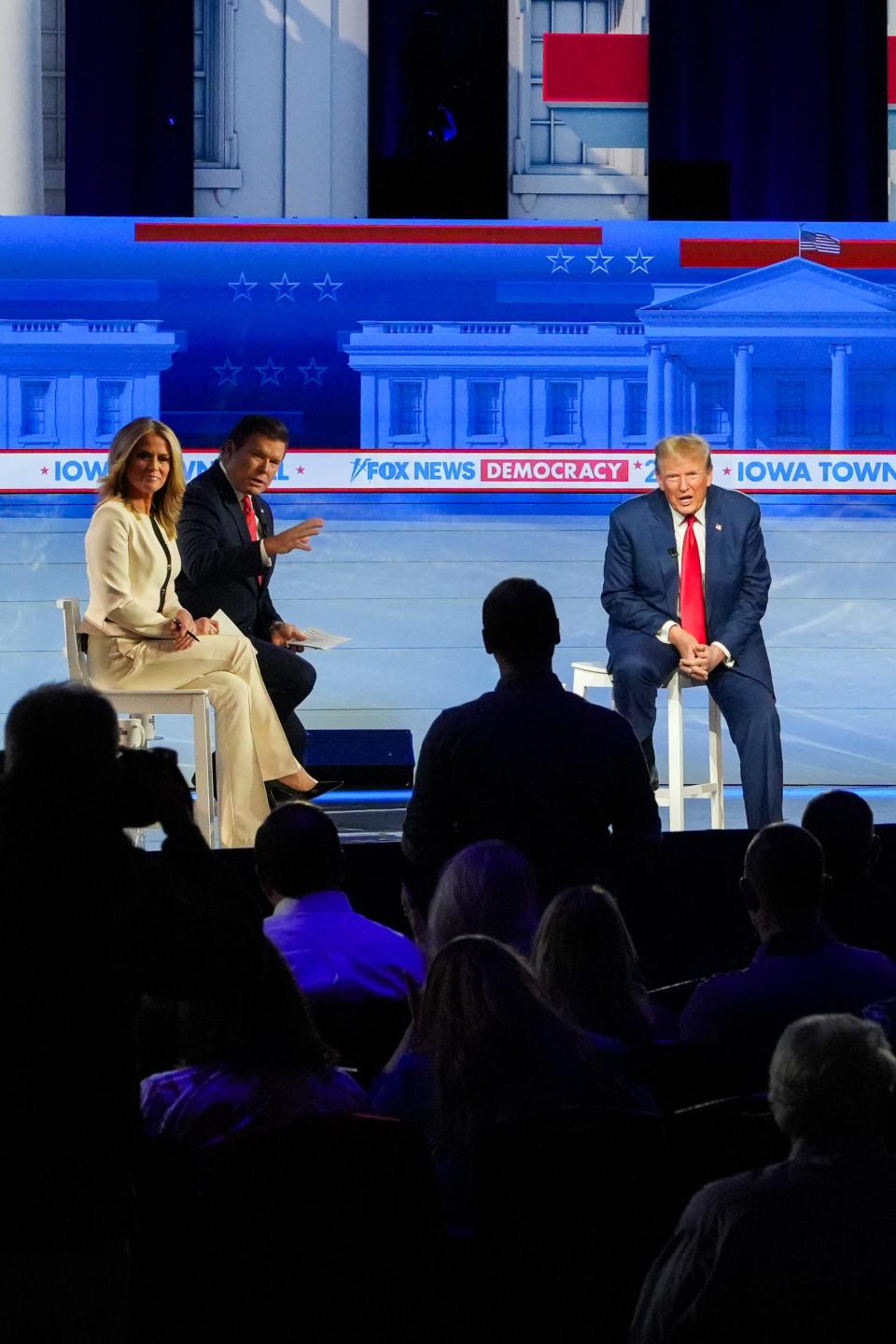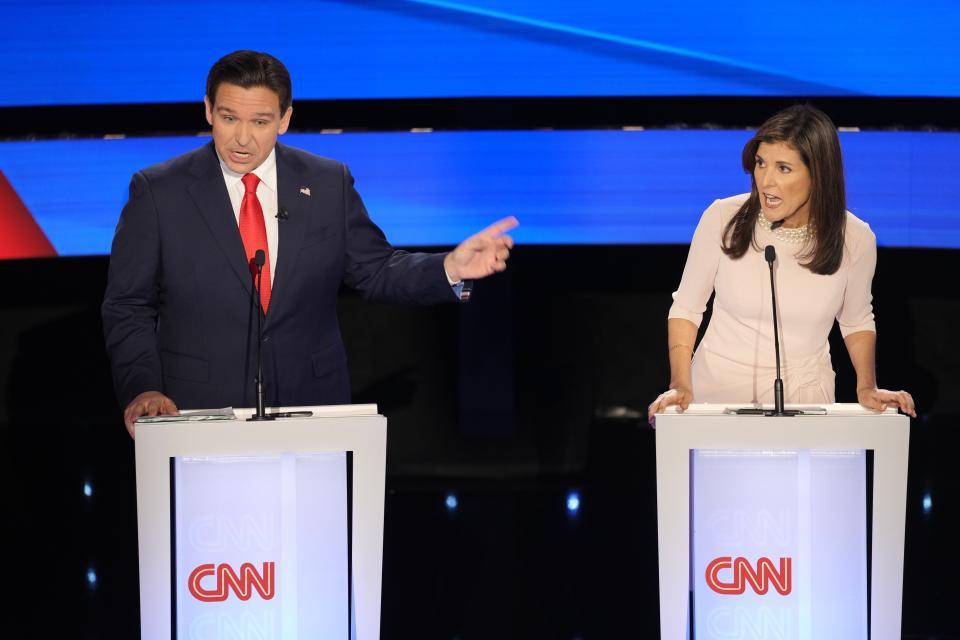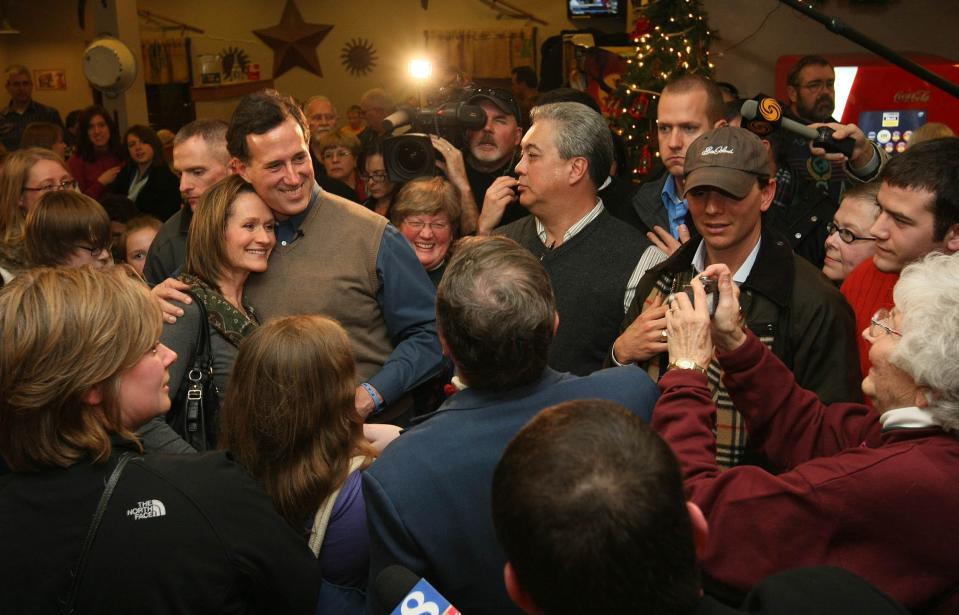Turnout, key counties and evangelicals: What to watch for as GOP Iowa Caucus results come in
- Oops!Something went wrong.Please try again later.
- Oops!Something went wrong.Please try again later.
- Oops!Something went wrong.Please try again later.
This year’s Iowa Caucus race has been remarkably, and for some, frustratingly, static — and the winner seems all but certain.
But Iowa Republicans say there's still plenty of drama and intrigue to be gleaned on caucus night if you know where to look.
What can the results in Sioux County tell us about the fractured nature of modern evangelicals? And what does it mean if Nikki Haley can pull off a win in central Iowa's Webster County?
Here are nine questions on our mind going into Caucus Day, and what their answers might say about the state of the Republican race for president.
Will Donald Trump meet his sky-high expectations, or will Nikki Haley or Ron DeSantis close the gap?
“There's two races to watch,” said Republican operative David Kochel, an Iowa Caucus campaign veteran. “Trump vs. his expectations — because that will be how he's viewed, since it's now kind of assumed that he'll win. And then the other race is Haley vs. DeSantis. Who can make the strongest argument coming out of Iowa and into New Hampshire and beyond?”
The Iowa Caucuses are a game of expectations, and the expectation is that Trump will perform better than any Republican candidate in history on Monday.
Although some Democrats have run away with the Iowa Caucuses, Bob Dole’s 12-point win over Pat Buchanan in 1996 is the widest winning margin for a contested Republican caucus.
Trump currently sits at 48%, with a roughly 30-point lead over his competitors in Iowa, according to the latest Des Moines Register/NBC News/Mediacom Iowa Poll.
More: Iowa caucus night: Where to find results, follow live coverage
If he doesn’t match those expectations, his competitors will point to it as a sign of his weakness.
“He really does need to get at least 50% in (Iowa) to demonstrate to the voters that he's everything he says he is, which is the heir apparent,” said Republican operative Alice Stewart, who worked on the Iowa Caucus campaigns for Ted Cruz, Rick Santorum and Mike Huckabee.
But how much can Ron DeSantis and Nikki Haley narrow that margin?
“Anything in the realm of 20% to 25% for Haley or DeSantis is where they want to be,” she said. “Anything under 20 is not encouraging.”
Can Donald Trump grow his support?
Trump has performed extraordinarily well across Iowa in his previous campaigns, but Kochel said there are regions of the state to watch to see whether Trump can improve on his past support.
“Trump was really dominant in the rural and exurban counties, particularly, you know, sort of east of I-35 and south of I-80,” Kochel said, referencing the two major interstates that bisect the state from north-to-south and east-to-west.
“We kind of understand them as the Obama-to-Trump counties,” he said. “Those upper Mississippi Valley counties, whether it's in Iowa or Wisconsin or Minnesota — all these counties really flipped from Obama to Trump, and it's the white working-class demographic that Trump really over-indexes with. So kind of watch those.”
Can Nikki Haley win in rural areas?
U.S. Sen. Marco Rubio won five counties in his 2016 run — Polk, Dallas, Story, Johnson and Scott — all of them urban population centers where incomes and education levels tend to be a little higher than in other parts of the state.
Rubio’s performance was enough to earn him a surprisingly strong third place that year, but it didn’t represent a big enough coalition to be viable far beyond Iowa. He ended his campaign in March after losing to Trump in his home state of Florida.
Some Iowa Republicans worry that Haley’s coalition will look similar. One of them is operative Jimmy Centers.
“If I'm a supporter of Ambassador Haley's, I’d be worried that she's going to go the road of Marco Rubio in 2016, in that Rubio then, her now, appeal a lot to more college-educated Republican voters in large population centers, and just get wiped away in more of the rural counties,” he said. “And so if Ambassador Haley's only doing well in Scott, Johnson, Linn, Polk, Dallas and Woodbury County, that's not going to do it. And the same goes for Gov. DeSantis.”
Centers said he’ll be watching counties like Webster, which is home to mid-size cities such as Fort Dodge as well as smaller towns, to see if Haley can pull off any crossover appeal.
Will northwest Iowa turn out for Ron DeSantis?
Iowa Republicans are predicting that DeSantis will have his strongest showing in northwest Iowa, which is among Iowa’s most conservative regions and home to strong evangelical populations.
According to the January Iowa Poll, Trump led among evangelicals with 51%. DeSantis got 22% and Haley got 12%.
“If that gets up to 30-plus, he's going to have a great night,” Centers said. “He's going to get second place. And he's going to put a little bit of margin between himself and Ambassador Haley, which is exactly what he needs going forward.”
Counties to watch: Lyon, Sioux and Plymouth, which are all tucked into Iowa’s far northwest corner.
Sioux County in particular could be interesting. It was Trump’s worst county in 2016, where he was largely rejected by the county’s religious Dutch Reformed population.
DeSantis has campaigned regularly in this region and has the support of evangelical leader Bob Vander Plaats, who endorsed his campaign late last year.
“What is turnout like, and did Gov. DeSantis do enough to have them turn towards him when former President Trump, from a policy standpoint, gave them about everything they could have hoped for in a president,” Centers said. “It's just, frankly, the bluster that comes out of the former president that turns some of those folks off. And so if Gov. DeSantis has been able to flip them into his camp, that's going to go a long way to him being able to secure one of those tickets out of Iowa.”
Will evangelicals coalesce around a candidate, or will they remain fractured?
Iowa Republicans say this caucus cycle is noteworthy because, for the first time in years, the evangelical community doesn’t appear to have united behind a candidate.
“Think about the people who have successfully and effectively mobilized evangelical caucusgoers in the past, and they're (currently) splintered between the candidates,” Iowa Republican operative Nicole Schlinger said. “You know, Sarah Huckabee Sanders is with President Trump. Gov. Reynolds and Bob Vander Plaats are with Ron DeSantis. Marlys Popma's with Nikki Haley. And so, I of course think that how northwest Iowa turns out will be of particular interest.”
Kochel said he’ll be watching the demographic breaks among evangelicals on caucus night.
“Does DeSantis get those northwest Iowa, slightly more affluent, more college educated voters — you know, the Dutch Reformed and Sioux County kind of folks. And does Trump get more of that white, working-class evangelical who maybe doesn't have as high a church attendance but still identifies as evangelical?”
If those demographic alignments turn out to be true, who would they benefit most on caucus night?
“I would say that the latter will have a higher turnout percentage,” Kochel said. “But I don't think there's as many of them.”
Will turnout be up or down?
According to the Iowa Secretary of State’s Office, there are about 752,200 registered Republicans in Iowa, as of Jan. 2 — about 34% of the state’s 2.2 million registered voters. Would-be caucusgoers also can register at their caucus site.
Republicans set a record turnout in the 2016 caucuses when about 187,000 people participated, or about 29% of registered Republicans at the time.
In the two previous GOP caucuses, turnout hovered around 120,000, or about 20%.
Republican strategists this year are predicting that higher turnout will benefit Trump, “because he's got more available supporters to turn out,” Kochel said.
Centers said Trump historically attracted new people into the party. And the Register’s Iowa Poll shows that 56% of first-time caucusgoers say they plan to support Trump.

If that group shows up to caucus for Trump, “he’s going to run away with this thing,” Centers said.
Kochel said he’s putting the “over-under” mark at 150,000 caucus participants. Anything higher will benefit Trump, and anything lower will benefit his competitors.
Trump has acknowledged as much, telling Iowans at a recent Mason City rally that he needs high turnout on Caucus Day.
“The biggest risk is you say, you know, ‘We’re winning by so much, darling, let’s stay home and watch television,’” he said. “And if enough people do that, it’s not going to be pretty.”
Centers agreed.
“I think if it's 160,000 or south, I think it means that former President Trump is going to underperform, and so you're going to see a better night for Gov. DeSantis, Ambassador Halley and others,” he said. “If it’s north of 175,000, I think it's going to be a great night for the former president, and he rolls out of here with a big win and wind firmly at his back already.
"And I think it has a chance, even with the cold weather forecasts, I think it has a chance to be upwards to 190,000 or so.”
How will the historically bad weather affect the results?
Jan. 15 is on track to be the coldest Caucus Day in the contest’s 52-year history, with snowfall leading up to the big day.
“It is a wildcard like we have never seen before,” Schlinger said.
More: Iowa Caucus Day is expected to be bitterly cold. Here are the records for coldest caucuses:
Kochel said that if the weather depresses turnout by about 5%, it’s likely to affect all the candidates equally. But if that ends up being higher, it could disproportionately hurt the candidates who over-index support among older Iowans.
Among likely caucusgoers who are 65 and older, Trump leads with 52%. Haley follows with 24%, and DeSantis gets 13%.
“It's going to be 4 (degrees) below that night and there's an extra six inches of snow on the ground,” he said. “I put my money on a 40-year-old who already went to work that day and has no trouble being out and about over somebody who's 75 and doesn't really want to drive in it.”
It could also disproportionately affect the candidates whose support is coming primarily from rural areas.
“People may live farther from their caucus location,” Schlinger said. “It's an older demographic who has to drive on gravel at night to go to a caucus location 15 miles away, and the diesel in their truck is gelled up. You know, those are real life consequences. And so, I think you will have different geographic disparities at play.”

Who can mobilize their grassroots organization to combat the weather challenges?
Each of the campaigns has boasted about their on-the-ground organizing, and Trump and DeSantis especially have touted the reach of their networks and their ability to recruit precinct captains and knock doors.
More: How Donald Trump's 2024 campaign quietly built a grassroots juggernaut for the Iowa Caucuses
But the cold weather will put their operations to a different kind of test, Iowa Republicans said.
A well-operated campaign might organize to ensure younger supporters with four-wheel-drive vehicles are on hand to arrange rides for their older counterparts, for example. Or to make sure their supporters’ driveways have been plowed or shoveled.
More: Ron DeSantis PAC flexes ground game ahead of Iowa Caucuses. Is it enough to beat Trump?
“I remember in 2008 calling all over town to find a place that I could borrow wheelchairs, because we had some people that were willing to caucus if we could figure out how to get them in the building,” Schlinger said. “And so I think that you are going to see situations like that writ large. … I think this is going to be a matter of organization plus ingenuity. I think that that's ultimately to me what it comes down to.”
Will it all run smoothly?
After Iowa Democrats’ 2020 caucuses collapsed in spectacular fashion and the national party removed their first-in-the-nation status, Iowa Republicans are going into the 2024 caucuses determined to make sure the night goes smoothly.
Although the Republicans’ caucus process is far simpler — they enter a room and cast a secret ballot that is immediately counted — they’ve also faced scrutiny in the past for their own missteps. Most notably, the party declared the wrong winner in 2012 when just a handful of votes separated Mitt Romney and Rick Santorum.
National Republicans have been supportive of Iowa keeping its first-in-the-nation status, but that could all change if Monday doesn’t go well.

Schlinger said it’s important to remember that the caucuses are not an election organized by the state, but rather a party organizing function run primarily by volunteers.
“And so I think people need to have patience and grace,” she said. “In some areas of the state, we may be dealing with long lines. It sometimes can take longer to report (results) than people would like it to. You know, we let people stand up and have their say before they vote. We have volunteers who are carefully counting and observing those votes. And so don't expect a result early. That would be the first thing that I would encourage people, is to remember what makes the caucus different and special and unique. And that's ultimately why this process is so valuable.”
Party officials say they’ve built in important redundancies to their counting system, and they anticipate a well-run caucus night.
“We have some really experienced party leaders right now,” Schlinger said. “There is no one who is running this that hasn't been through it before, who doesn't understand it backwards and forwards. So I feel very confident in our party leadership's ability to count accurately and securely.”
Brianne Pfannenstiel is the chief politics reporter for the Register. Reach her at bpfann@dmreg.com or 515-284-8244. Follow her on Twitter at @brianneDMR.
This article originally appeared on Des Moines Register: Iowa Caucus Day 2024: What to watch for as Republican results come in

